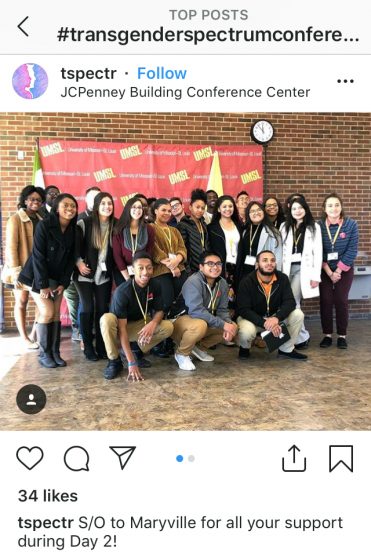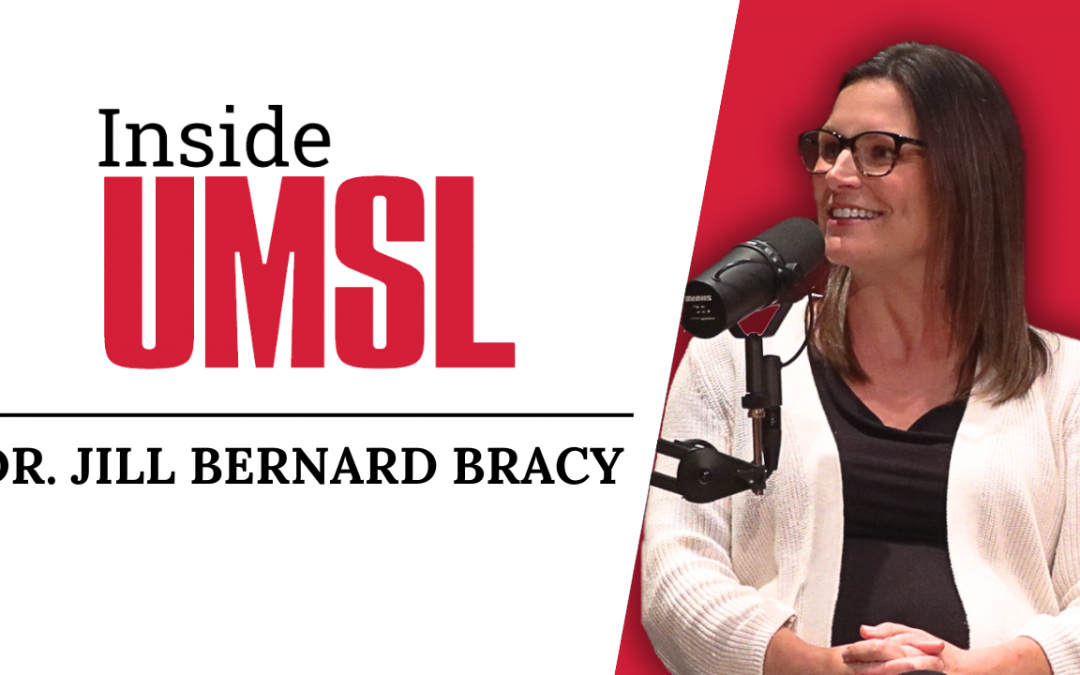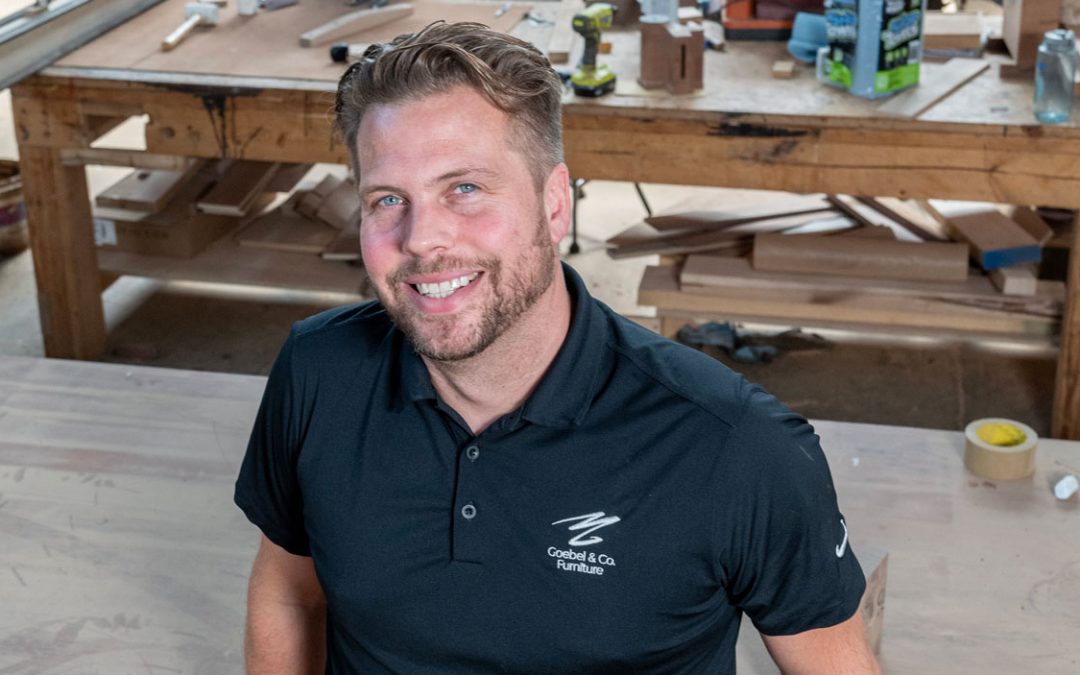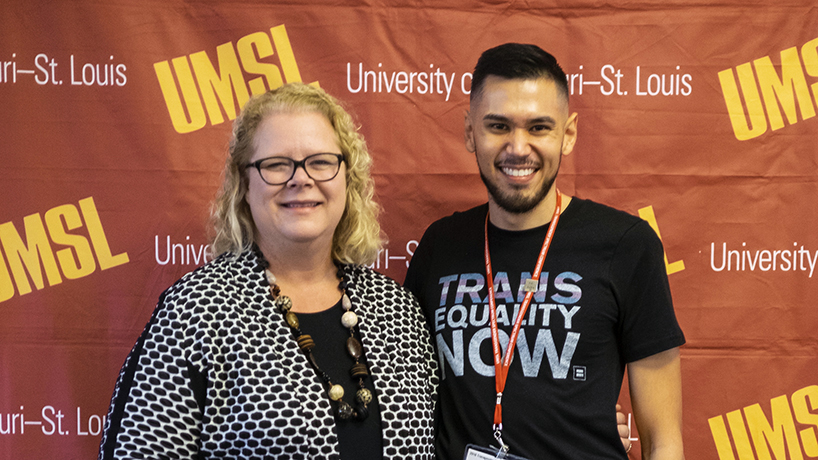
UMSL Provost and Executive Vice Chancellor Kristin Sobolik (left) and conference chair and LGBTQ+ Coordinator Harry Hawkins (right) posed at the Transgender Spectrum Conference’s media wall on Friday. UMSL hosted the fifth annual conference in the J.C. Penney Conference Center. (Photos by Jessica Rogen)
For its fifth iteration, the Transgender Spectrum Conference returned to its original home at the University of Missouri–St. Louis.
Held annually, the conference brings together the transgender communities of the greater St. Louis area and beyond to enhance visibility and provide resources for community members, parents, allies and professionals such as counselors, social workers and teachers. It took place on Friday and Saturday in the J.C. Penney Conference Center.
The conference is the result of ongoing collaboration with Washington University in St. Louis, which housed the conference for the past two years after UMSL served as as host in the inaugural and subsequent events in 2014 and 2015.
“It was a collaboration of some professors, students and staff here at our campus,” said Harry Hawkins, conference chair and LGBTQ+ coordinator at UMSL. “It’s empowering and allows the trans community to talk about events in the St. Louis area over the past year. It’s also a chance to educate cisgender allies that may not know as much about the transgender communities.”
In addition to Hawkins, a board comprised of community members and academics from UMSL, WUSTL, Webster University and Saint Louis University organized the 2018 conference. Turnout trended up from 2017’s 300-some attendees, and a record number of students from UMSL and area schools such as Lindenwood, Maryville, Webster and WUSTL registered.
“It just brings in a lot of people,” Hawkins said. “Parents who had transgender kids or even some transgender parents themselves. They come to this conference every year to get the latest information on, really, just anything – education or medical advancement or community updates, things like that. Some folks, they come every year, and they get to see their friends, and they get to see people they haven’t seen, and I’m looking forward to seeing some of the people that I met last year as well. It’s a conference that serves a lot of needs.”
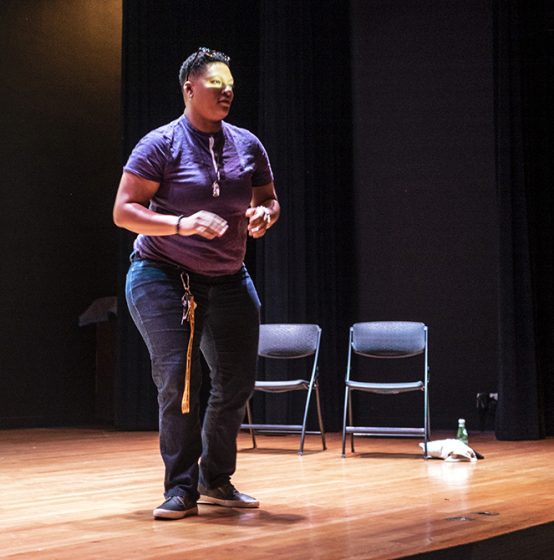
Jay-Marie Hill from the American Civil Liberties Union of Missouri spoke on the opening plenary panel, the State of Trans address.
Kristin Sobolik, UMSL provost, executive vice chancellor and professor of anthropology, kicked off events on Friday by telling a personal story of advocating in the Doe v. Clency case, which was the first instance of a state court ruling in favor of transgender bathroom rights.
“Progress has been made and lost and made again,” she said. “It’s part of my privilege to be part of that process.”
The opening plenary panel, the State of Trans Address, featured speakers Sayer Johnson from the Metro Trans Umbrella Group, Jaimie Hileman from Trans Education Service of St. Louis and Jay-Marie Hill from the American Civil Liberties Union of Missouri. Hill spoke on the Missouri Nondiscrimination Act, which, for the second time in 20 years, the state house committee passed this May.
“We need a whole state that cares that we exist,” Hill said. “We can disagree about things unless your objection interferes with my right to exist.”
Hileman followed, covering the Affordable Care Act, bathroom bans, St. Louis’ new Transgender Memorial Garden, the military ban and more. Despite the challenges, she chose to see possibility in the victories, calling it “a case for hope.” Johnson wrapped up the panel with a discussion of the lack of systems in place for transgender peoples and how MTUG is changing that.
Other panels ranged in topic from Trans or Nonbinary 101, parenting, education, medicine, lobbying, legal advice, storytelling and more. The speakers themselves were just as varied and represented organizations such as Babson College, Armstrong Teasdale, Ferguson Readings on Race, Johns Hopkins University, Louisiana State University, McDaniel College, PROMO, SAGE: Advocacy & Services for LBGT Elders, Sisters of St. Joseph of Carondelet, TransParent USA, That Uppity Theater Company, ThinkWell Counseling, VA St. Louis Healthcare System, UMSL, University of Michigan, Walden University, Women’s Empowerment through Cape Area Networking, WUSTL, Virginia Commonwealth University and others.
Students from Director of Business Collaboration and Assistant Teaching Professor Perry Drake’s “Digital and Social Media Marketing Lab” took on the conference as a client and provided social media and branding for the event. The class created a hashtag, #TSC18, and BSBA students Madison Martin, a senior, and Lauren Pivac, a sophomore, were on hand at the social media wall to run the Instagram and Facebook feeds and share the stories of participants.
One attendee, Rachel Wyrick, a counseling MEd student, said she had decided to come because she was interested in the research, information and speakers as well as exploring more about non-binary gender identity and being an ally.
“It’s important to educate people in the community that are ignorant to this culture,” Wyrick said. “On an education and political level, it feels really important right now.”
The gender-nonconforming activist Janaya Khan gave the keynote address on Saturday. Khan cofounded Black Lives Matter Canada and is a prominent social justice educator. They implored attendees to advocate for justice for all peoples.
“We need to protect each other, but it can’t just be trans and nonbinary people protecting ourselves,” Khan said. “We actually need to rely on others who are taking it just as personally. We need a culture shift.
“I want us to leave with this if nothing else: We need to reframe how we enter movements. I believe that identity should be and can be our entry point into movements. But it should not be our exit point. I originally started fighting for black people because I am a black person. That makes a lot of sense. But it is no longer why I fight for black people. I fight for black people because I understand that black liberation can help the liberation of others. Because I am bound by my politics, I can show up for native struggles, Muslim struggles, for feminist struggles. I need to show up for people in the same way that we show up for ourselves. Identity should be our entry points into movements, but they should not be our exit points. If I was only fighting for people like me, all I would be doing is reframing colonialism to be more convenient for someone like me. It is time for us to take s— personally.”
Hawkins considers UMSL a natural fit for the conference and notes how the university’s new mission statement, We Transform Lives, jives perfectly.
“The impact that it has, how it brings the community together, how we have folks that come to it once a year from all over Missouri and in the region – we are going to transform people’s lives,” he said. “That we can have these types of conferences here and provide that information for our community, that’s huge; that’s a really big thing. I just go back to We Transform Lives, and also, the word ‘trans’ is in it. It’s all very good.”

